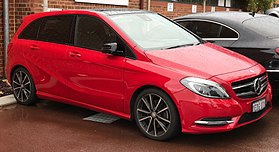Mercedes-Benz B-Class
| Mercedes-Benz B-Class | |
|---|---|
 |
|
| Overview | |
| Manufacturer | Daimler AG |
| Production | 2005–present |
| Assembly |
Rastatt, Germany Kecskemét, Hungary |
| Body and chassis | |
| Class | Compact car (2005–present) |
| Body style | 5-door hatchback |
| Layout | FF layout |
| First generation | |
|---|---|

Before facelift
|
|
| Overview | |
| Production | 2005–2011 |
| Model years | 2006–2011 |
| Body and chassis | |
| Platform | Mercedes-Benz T245 |
| Dimensions | |
| Wheelbase | 2006–08: 2,786 mm (109.7 in) 2009-11: 2,779 mm (109.4 in) |
| Length | 4,270 mm (168.1 in) |
| Width | 1,778 mm (70.0 in) |
| Height | 2006–08: 1,613 mm (63.5 in) 2009–11: 1,603 mm (63.1 in) |
| Second generation | |
|---|---|

Before facelift
|
|
| Overview | |
| Production | 2011–present |
| Model years | 2012–present |
| Body and chassis | |
| Platform | Mercedes-Benz W246 |
| Powertrain | |
| Engine | electric motor |
| Transmission |
6-speed manual |
| Dimensions | |
| Wheelbase | 2,699 mm (106.3 in) |
| Length | 4,359 mm (171.6 in) |
| Width | 1,786 mm (70.3 in) |
| Height | 1,557 mm (61.3 in) |
The Mercedes-Benz B-Class is a compact luxury car produced by German automaker Mercedes-Benz since 2005. Mercedes-Benz markets it as a sports compact tourer. It is similar to the A-Class, though bigger and with bigger engines. The European New Car Assessment Programme (Euro NCAP) classifies it as a small MPV (multi-purpose vehicle). As of December 20, 2013, delivery of B-Class vehicles reached 1 million since the launch of the B-Class in 2005.
In 2005 it was introduced in spring in Europe and in autumn in Canada. The B-Class is a front-wheel drive car with a sandwich floor construction and a parabolic rear suspension. The B-Class has a two-box design: one box for the drivetrain and another the passenger and luggage compartments. The B-Class gains much of its comparatively large interior volume through its height, a configuration that makes the most of the vehicle’s footprint. Having evolved from the even smaller A-Class it retained that car's sandwich floor concept. The A-Class was originally intended to have a battery-powered version that would meet California’s (since-rescinded) zero-emissions mandate, and the batteries were supposed to go between the floors.
All models included many passive automobile safety systems like ESP, ABS, traction control, cornering lights, active lighting system, and headlamp assist. In the event of a frontal impact the engine and transmission slides beneath the passenger compartment.
In 2008 it was updated with a start-stop system and a BlueEFFICIENCY option. A new NGT variant was added, which could burn either gasoline or natural gas.
In 2011 Mercedes-Benz did a world tour with three of its Mercedes-Benz F-Cell vehicles, one of which was the B-Class. The hydrogen-powered fuel cell vehicle was driven more than 30,000 kilometres in a circumnavigation of the globe, starting and ending in Stuttgart.
...
Wikipedia
